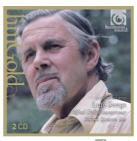Texte paru dans: / Appeared in:
*
GRAMOPHONE (11/1978)
Pour s'abonner /
Subscription information
Harmonia Mundi
HMG 50244/45

3149020024416
Reviewer: David
Fallows
Flrst ,Book. Wilt thou unkind;
Come away, come sweet love; Come again sweet love; I f my complaints; Can
she excuse my wrongs?; Come hea~y sleep. Second Book. Flow my tears; Sorrow
stay; I saw my lady weep; Shall I sue? Third Book. Weep you no more, sad
fountains; Me, me and none but me; What i f I never speed; Say, love, If
ever thou didst f ind; Flow not so fast, ye fouritalns. PI/grim's Solace.
Lasso, vita mla; From silent night; If that a sinner's sighs; Go nightly
cares. Musical Banquet. In darkness let me dwell. Consort Pieces. Fortune my
foe ; The Frogg galliard; The Round Battie gall lard ; Lachrimae pavan; Can
she excuse?; Katherine Darcy's galllard. Bandoura Solos . Galliard (The King
of Denmark) ; The Lady Laeton's almaln . Lute' Solos. The shoemaker's wife;
Can she excuse?; Mistress White's thing; Orlando sleepeth; Tarleton's
resurrection; Sir John Smith's almain; Mistress White's nothing; MIdnight;
Mistress Winter's lump; Melancholy galljard; My Lady Hundsdon 's puffe. Lute
Duets. My Lord Chamberlain's galliard; My Lord Willoughby's welcome home.
With representative works from all branches of Dowland's output except for
vocal ensembles, sacred music and viol consorts , this set bids fair to
challenge the L 'Oiseau-Lyre 'complete works' project on 20-odd records: it
gives a good, broad picture of Dowland's importance, selecting favourite
songs from each of the song-books and interspersing them with splendidly
performed instrumental pieces. Each side normally begins with a couple of
songs and then has some instrumental pieces before closing with a few more
songs.
But perhaps the set's major importance, historically speaking, will be that it contains what must presumably be Alfred Deller's last comprehensive statement on Dowland : all 20 songs here are performed by him, and he has recorded many of them before. At the age of 65, and with an enormous career behind him, he is, of course, going to give performances that must be accepted on their own terms. He keeps the voice extremely soft most of the time, almost crooning into the microphone; and his voice often dies away quite unpredictably in a manner that apparently represents a careful compromise between the way he now thinks about the songs and the need to treat his voice with care. In Sorrow stay at the end of the second side at the words "but down, down" he allows us to hear the full voice for the first time on the set: it seems a curious moment to choose, but once again it should perhaps be understood in the light of the experience of Deller's improbably long career.
If the singing is difficult to judge objectively, the lute playing of Robert Spencer is unquestionably superb: there are players with more agility and players 'purer' in their instruments and technique but none, I think, more musically attuned to Dowland's pieces. Very soon we shall have all Dowland's lute music on record and quite a lot of it available in several different recordings: when that happens Spencer's performances here will have to be kept close at hand for purposes of comparison.
In the consort pieces, the Consort
of Six play fluently and with good balance: as so often, the sound of this
instrumental grouping is not caught quite clearly enough by the engineers, but
the quality of the sound is in general very pleasing.
Cliquez l'un ou l'autre
bouton pour découvrir bien d'autres critiques de CD
Click either button for many other reviews


